South Paw Farm owner says despite grant funding farms are struggling
By Dani Walczak
Meg Mitchell, co-owner of South Paw Farm in Freedom, Maine, is tired of perseverance stories. The narrative of the hard-working white farmer personally overcoming obstacles to feed their community has started to fall flat for the farm owner of 15 years.
Maine farmers have their fair share of struggles, from the unpredictability of farming in the age of climate change to dealing with the aftermath of PFAS chemical contamination across the state. This group of so-called “forever chemicals” has been found in the fields or waters of towns surrounding South Paw Farm, in Albion, Unity and Knox, though South Paw has not been contaminated. With these challenges and others, farmers are struggling to pay their employees or turn a profit year after year — or both. Yet many small farms continue, Mitchell contends, because of an influx of grant money available to farmers in Maine.
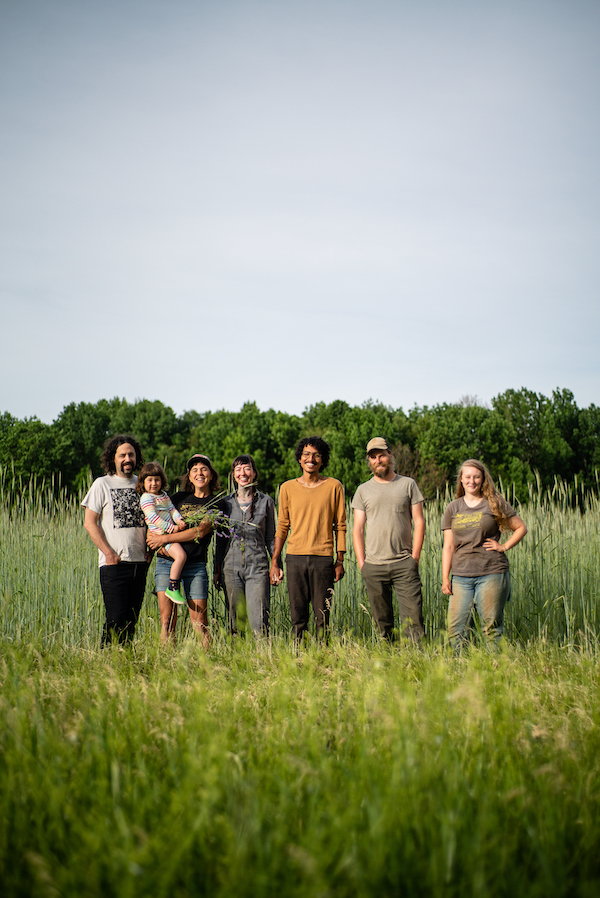
Meg’s partner Ryan Mitchell, who co-owns the farm, has been working mostly off-farm year-round at Fedco since 2019 but still does equipment maintenance and helps in various other ways around the farm. Between 2018 and 2023, the farm received $450,000 in grant funding, which helped to upgrade needed infrastructure, buy a high tunnel, take a business class, pay their employees more, start a value-added canning and preserving line and, in 2020, begin transitioning to plastic-free packaging. Despite this support, the farm is still barely breaking even each year.
“The only way I feel like we’ve been able to grow and sustain is through grants — government, state, local — that make it so we can invest,” Mitchell says. She adds that even though their operation is break-even at best, they work to pay employees what they feel is the high end of wages for the agriculture industry but what actually amounts to the low end of poverty wages.
“It just seems like a really hard business to sustain,” says Mitchell.
Although grant money is abundant, there are barriers to accessing this money. Mitchell, who grew up in Georgia, went to a private school where she learned persuasive writing and professional communications, computer skills, and how to manage deadlines.
At age 21, she moved to Maine and farmed as an apprentice for four years at Freedom Farm. She later enrolled in MOFGA’s Journeyperson Program, founding South Paw Farm when she took out a private mortgage through owner-financing on 4 acres of land in Unity. She says she obtained that mortgage through her connections and trustworthiness, and because of the skills she learned through private education.
“I know my parents had enough money to send me to private school because of the equity they earned through property transactions and corporate jobs that they were qualified for because of the educational opportunities that were available to them. Because my grandparents had access to cheap land and business opportunities through the racist G.I. Bill, they were able to pass those privileges on to my parents and in turn on to me,” Mitchell says.
In 2015, Meg and Ryan received the opportunity to buy Freedom Farm from her farm mentors. They bought the turn-key property and continued to maintain the farm’s existing systems, cultivating 18 acres of land with 10 seasonal employees under the South Paw Farm brand. South Paw Farm was growing 50% for wholesale and 50% for farmers’ markets.
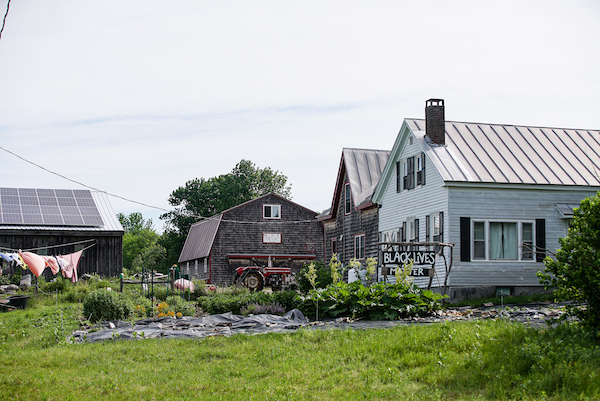
Then came the drought of 2016, then another in 2017. By 2018 the pattern was clear.
Rather than stretching water over 18 acres, she could condense irrigation to 6 to 8 acres and get better yields and quality. When she made the change in 2019, the farm’s gross income was higher on the smaller acreage.
Despite all these improvements, the farm was barely making a profit each year. Mitchell took a Maine Farmland Trust farm business planning course, Farming For Wholesale, where she created enterprise budgets, figuring out which crops were profitable and which were not. Mitchell was surprised to discover how the farm was losing money on many crops — whole acres of land. She narrowed what they grow to 16 types of vegetables.
“Three years in a row we lost money on potatoes and left the field in a weedy mess. That takes a whole acre of water that could have gone somewhere else. And just the stress — cultivation, pest control — I feel like that was a really healthy change,” Mitchell says.
After reducing acreage, South Paw Farm continued vending at markets but had to short wholesale accounts. Mitchell felt she was underserving both.
Then in the spring of 2020, Mitchell suffered a head injury playing recreational soccer. “I could not cope with the 300 conversations you have a day at market, plus driving,” she says.
After speaking with the farm’s financial advisor, she set the sales goals she needed to meet each month and pulled out of farmers’ markets, focusing entirely on wholesale.
“The machismo that it takes to put up a display and sell a lot of produce and be a big player in the market scene — I didn’t feel able to perform that anymore. Letting go of it — even though it was something I knew I wanted to do — was the right decision, it was still a little difficult,” Mitchell says.
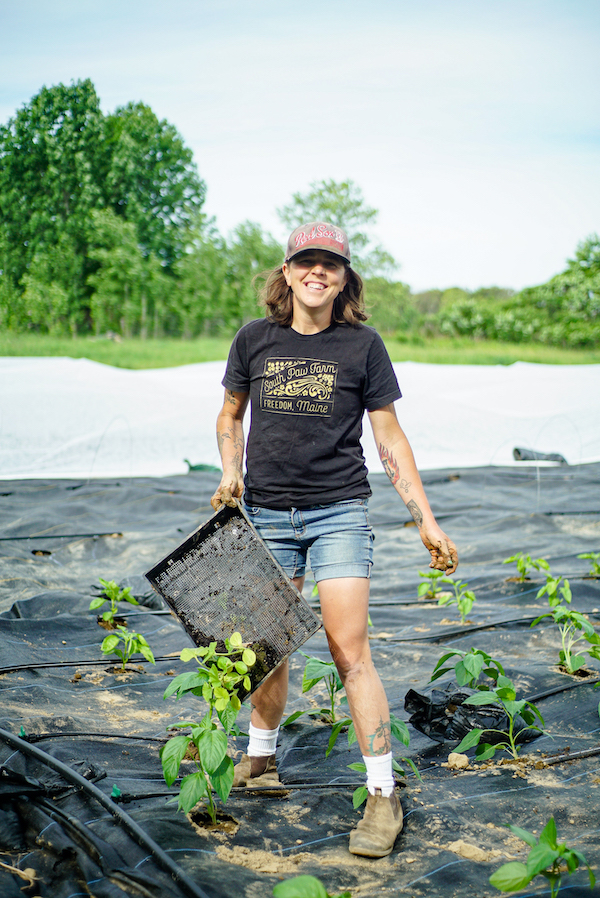
Focusing on wholesale streamlined the farm’s business and reduced waste, as they could now pick to order. Mitchell was able to forgo waking up at 2 a.m. for market, work mostly set hours, do more grant writing and focus on improving communication with her committed employees.
Mitchell also started to understand the myths the local food movement tells about farmers — and that farmers may tell about themselves. She started to see how her farm business was built off 80-hour work weeks. She began separating her identity from the farm.
“It’s so easy for a sole business owner to get wrapped up in ‘this is my operation, and this is my kingdom, and this is all I do. All I do is operate out of this need to keep my business prosperous.’ I definitely get wrapped up in that still, but it has a way of alienating your closest supporters, because if you end up as a martyr, it’s a weird way of distancing yourself from the people who are supporting you, because they don’t want to see you hurting.”
Mitchell says your co-workers don’t want to see you overtired and working on the day you’re supposed to be with your family. Instead, she has a goal for her team to live balanced lives.
“I’m not saying we’ve obtained it at all. Even if we’ve come close to it, it’s because of that white privilege and because of those grants. It’s because of the access to resources that we’ve had. It’s not because of some smart thing we’ve figured out to do.”
* * * *
Mitchell now values flexibility. By paring down her business she began honing in on what was most important, what she had the most control over: not profitability but the mutual respect she and her employees built together.
“It doesn’t feel like a good business model but the work does feel worthwhile. I do feel every year — as far as our crew — we have so much mutual respect, everyone enjoys coming to work, nobody feels stressed out here,” Mitchell says. “We’ve somehow figured out a way to enjoy our life, and I feel like what I’ve seen as the cost of viability for other farms a lot of the time is personal relationships. Whether it’s the partnership that owns the farm or kids having to sacrifice to make it work, or wages not being appropriate.”
Many of South Paw’s employees have worked at the farm for over 10 years. Mitchell gives her long-term employees more responsibility in the areas of cultivation, crop planning, sales and marketing.
In 2017, when she gave birth to her first child, she and Ryan began noticing how unsustainable the business felt.
“A big part has been letting go of things that we thought we could only do ourselves,” Mitchell says. “For some reason we gate-kept those tasks and we just decided not to do that anymore.”
Now any employee can order supplies, and there are four staff members who can write invoices.
This year Santiago Quiroz, who started working at the farm in 2015, managed the crop planning.
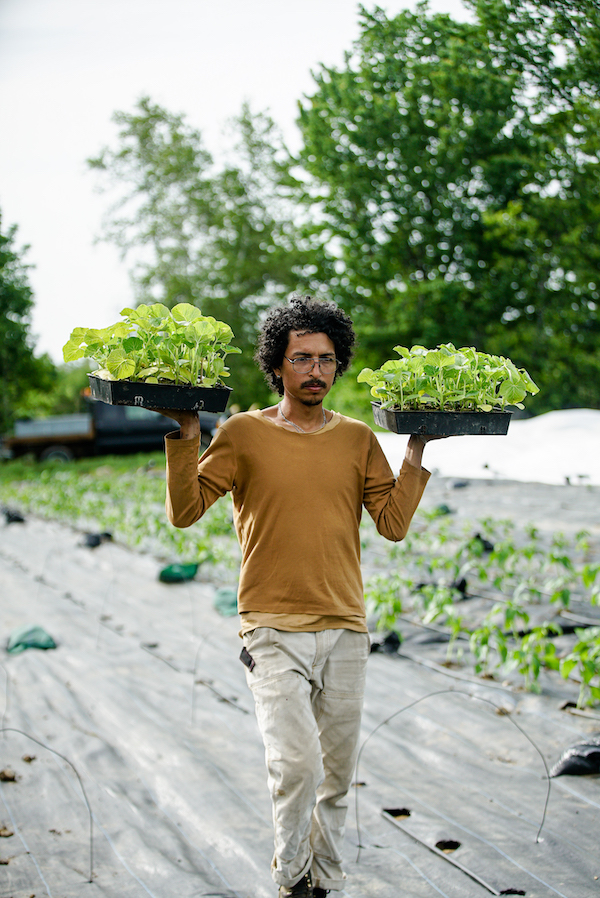
“He took pride over it, and when he trained other people to do it, those people understood that process in a better way.” Mitchell says that granting him more managerial responsibilities brought more consistency to that part of the farm’s system.
For Quiroz, this type of involvement keeps him coming back to the farm.
“Seeing ourselves grow, seeing each other grow, seeing myself grow as a farmer. Every year it seems like we get more responsibility and get to have more of a say in the decisions, which then makes you more involved and engaged in the project. Makes you put your heart into it and things that matter to me,” says Quiroz.
The crew is focused on building community with each other. This mutual respect, they attest, is the reason they show up to work and commit to each other.
“We all work hard to make sure we’re not making anyone feel disrespected or stressed out,” says Mike Showalter, another employee of over 10 years. “You’re at work, everyone has to work, you have to show up, why make it difficult for each other? I think we’re all on the same page with that.”
* * * *
Mitchell is aware of the financial equity she builds as a farm owner. In 2021, she transferred 4 acres of land she purchased, with the money received as a wedding gift from her parents, to Quiroz.
“The main reason I wanted to do it is because I felt like land access is something I’ve not had a problem with,” says Mitchell. “I have had ample land access, as well as other people on our crew, have had access to land, and mortgages, and ways to start building that foundation of equity, and it was just so clear to me that those were unearned privileges. And Santiago, who because of the nature of institutional racism, has not had access to that equity.”
Legal Food Hub, a project of Conservation Law Foundation, matched Mitchell and Quiroz up with pro bono lawyers. A fundraising campaign through GoFundMe raised $4,000 for a land survey, and the lawyers drew up a deed.
“I didn’t do anything to earn that land, it was just an accident of my birth basically and that doesn’t seem fair,” Mitchell says. “Also, for my children, I want them to participate in a world and be able to see equitable relationships. It seemed like an easy thing to do. A small thing that we could do.”
Mitchell has a keen awareness of the limitations of farm work for long-term employee sustainability whether it’s low pay, lack of benefits or lack of health care assistance.
“It doesn’t give them the type of money to be making the type of equity investments we’re making,” Mitchell says.
Yet despite the investments, often funded by grants, farmers, like Mitchell, are in a tough spot.
As she watches farms around her shrink and struggle, she signs up for another season, unsure of what else to do. Instead of focusing on profitability she chooses to commit to the bonds of the group of people who make up South Paw Farm.
“I don’t see another path forward that is livable,” she says. “We have this thing that’s been supporting us, as a crew, and our family, and just thinking of those long-term people as an extended family, we are reaching these social goals, but it doesn’t feel secure. Every year still feels like we’re trying to find a solution to our issues of profitability and longevity.”
Mitchell feels she keeps coming upon dead ends. She knows to be able to sustain farming, the solution has to be accessible to everyone.
In September of 2022, five days after Mitchell’s second child was born, employees came to harvest onions on the weekend. Community members came, too, to help bring in one of the farm’s sustaining crops for the year.
September is “basically the worst time of year to have a baby as an onion farmer,” says Mitchell. She adds, thanks to her crew, “I could totally step out and those three people in management positions skillfully guided those last couple months of harvest in, which is a huge part of what we do.”
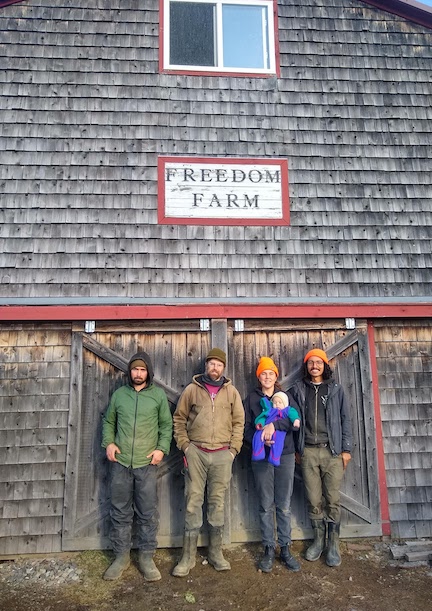
As Mitchell watched her community pull onions from the soil, she thought about when her first child was born: The crew was more fragmented, and she felt more self-conscious about not participating. Now the crew makes sure she doesn’t have to worry about that.
“We have this image of the vibrant agricultural scene, but really people’s bodies are falling apart, they can’t pay their workers enough,” says Mitchell. She believes that it’s a hard time for farmers right now. Mitchell doesn’t want to farm out of necessity and survival. “I want to continue to find ways to make it more equitable, because inherently it’s not.”
* * * *
Last season Mitchell and the crew slowly started to add no-till beds to reduce soil erosion; each year they add more biomass or cover crop coverage. They oriented the permanent beds in their new high tunnel perpendicular, creating shorter crop rows to increase both harvesting morale and airflow.
In early 2023 she planned to apply for grants again, to finish before spring growing began.
During the final dark months of 2022, she spent time with her newborn baby, while keeping the crew company as they sorted storage roots.
They turned down the World Cup on the radio so they could talk.
“Even though we’ve been at this for a long time I still feel like we’re novices,” Mitchell says.
“There’s always something to learn,” Showalter points out.
“That’s what you want. You don’t want to feel like you’ve learned it all either,” Quiroz says.
They all nod in agreement. “Then,” Showalter adds, “you’re in trouble.”
About the author: Dani Walczak is a farm worker-turned-gardener living in Portland, Maine. She writes about farming and cooks meals for the unsheltered population of Southern Maine with Preble Street.
This article originally appeared in the spring 2023 issue of The Maine Organic Farmer & Gardener.
